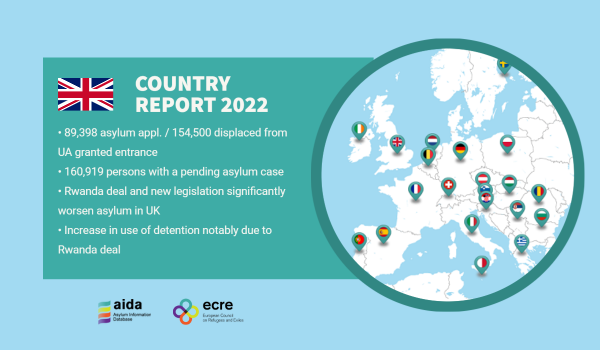The updated AIDA Country Report on the United Kingdom provides a detailed overview on legislative and practice-related developments from 2022 in asylum procedures, reception conditions, detention of asylum seekers, and content of international protection. It is accompanied by an annexe detailing the UK visa support schemes adopted in response to the displacement from Ukraine in 2022.
In 2022, 89,398 persons applied for asylum in the UK, mainly from Albania, Afghanistan and Iran. 18% of applicants were children. The recognition rate at first instance stood at 74% (70% refugee status, 4% subsidiary protection). However, the number of pending cases rose to 132,182 cases. The Home Office also served 21,532 claimants with ‘notices of intent’, although formally only 83 cases received inadmissibility decisions in 2021 and 2022.
The UK asylum legislative framework significantly evolved in 2022, starting with the Migration and Economic Development Partnership (MEDP) and Memorandum of Understanding (MoU) signed with Rwanda in April 2022. The MoU outsources the processing of asylum claims from some applicants in the UK by physically transferring them to Rwanda. The first planned flight was halted through an ECtHR interim measure in June 2022; at the national level individual decisions to transfer were quashed but the general principle of the MEDP was found to be legal in December 2022, a finding appealed by the individuals and CSOs.
Concurrently, the Nationality and Borders Act (NABA) gained Royal Assent in April 2022. Major developments from the NABA include putting into legislation inadmissibility rules per which a person deemed to have travelled through safe countries can be removed to that or another country; the differentiation between two groups of refugees, i.e. those deemed to have come directly to the UK, or having a reasonable excuse for not claiming asylum in the safe country through which they passed to reach the UK, or brought to the UK with prior authorisation (group 1 refugees), as opposed to the others (group 2 refugees); the removal of the right to appeal for cases deemed ‘clearly unfounded’; an obligation for asylum claims to be made at a designated place, thus inter alia prohibiting asking for asylum in UK territorial waters.
Access to the procedure worsened over 2022, with the average waiting time between registering an asylum claim and the screening interview more than tripling in the first quarter of 2022 to 67 days compared to the first quarter of 2021, and then further increasing to 121 days in quarter 3. At the same time, the backlog of cases rose significantly, concerning at the end of 2022 160,919 people. 88,929 cases had been pending for more than 6 months, 40,913 for 1 to 3 years.
The UK was also faced with a reception crisis, due to which the government continued using hotels to house persons in the asylum system. The NABA continues to foresee accommodation with shared sleeping quarters in the style of the former military barracks as a suitable accommodation solution for some asylum seekers, and guidance was issued at the end of the year in this regard. The situation is particularly concerning regarding children, with a number of them cared for outside the usual system, through the Home Office (and its contractors) instead of the local authorities, meaning children are outside of the framework and protection of children’s legislation.
The number of asylum seekers in detention also rose in part due to the MEDP with Rwanda. At least 14,227 asylum seekers were detained in 2022 in immigration removal centres, representing 70% of all immigration detainees in 2022. A short-term holding facility was opened in 2022 to increase capacity but was then emptied and closed after high controversy over living conditions and following the death of a person having been held at the camp after arriving in the UK.
In parallel, in response to the full-scale invasion of Ukraine and subsequent displacement, the UK introduced three support schemes: a Ukraine Family Scheme, for those seeking to join a family in the UK, the visa sponsorship scheme ‘Homes for Ukraine’, a hosting programme; and the Ukraine Extension Scheme for those already in the United Kingdom. A total of 256,929 persons applied to be granted entry into the UK under the two visa schemes Ukraine Family and Homes for Ukraine, out of which 209,829 persons were allowed to enter and 154,500 actually entered the UK. The government further granted 15,169 extensions under the Ukraine Extension Scheme.
For further information:
- Find comparative information in the Asylum Information Database (AIDA) managed by ECRE.

